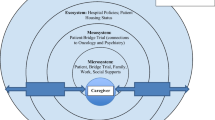Abstract
Purpose
The transition out of acute cancer treatment has been identified as a time of stress and uncertainty for cancer survivors, but little is known about how caregivers fare during this period. In this paper, we discuss caregiving work up to and including transition from initial care and the needs of caregivers during transition and beyond.
Methods
We held four focus groups with breast, prostate, and colorectal cancer survivors who had completed treatment with intent to cure and two with caregivers for the same population. Participants were affiliated with either an urban academic or rural community cancer center. The discussions focused on cancer-related experiences and needs during the transition out of acute cancer care.
Results
Focus groups included 47 people: 28 survivors and 19 caregivers. Three key caregiving themes identified the significance of support for the patient in the clinic, support for the patient in the home, and for caregiver self-care.
Conclusions
Discussions revealed aspects of caregiving that created difficulties for the caregiver themselves or between the caregiver and the cancer survivor. Caregiver experiences and needs may warrant explicit attention as survivors and caregivers are adjusting to a “new normal” that is no longer centered on getting through treatment.
Implications for cancer survivors
Patients and informal caregivers are often conceptualized as a “unit of care”; consideration of the needs of both is important for the provision of appropriate and effective health services.
Similar content being viewed by others
References
American Cancer Society. Cancer Treatment & Survivorship Facts & Figures 2016-2017. 2016. http://www.cancer.org/acs/groups/content/@research/documents/document/acspc-048074.pdf. Accessed 15 March 2017.
Krishnasamy M, Wilkie E, Haviland J. Lung cancer health care needs assessment: patients’ and informal carers’ responses to a national mail questionnaire survey. Palliat Med. 2001;15(3):213–27. https://doi.org/10.1191/026921601678576202.
Persson C, Östlund U, Wennman-Larsen A, Wengström Y, Gustavsson P. Health-related quality of life in significant others of patients dying from lung cancer. Palliat Med. 2008 Apr;22(3):239–47. https://doi.org/10.1002/pon.1433.
Journal of Healthcare Contracting. Cancer care migrates to an outpatient setting. 2011. http://www.jhconline.com/cancer-care-migrates-to-outpatient-setting-2.html. Accessed 1 March 2017.
Sharpe L, Butow P, Smith C, McConnell D, Clarke S. The relationship between available support, unmet needs and caregiver burden in patients with advanced cancer and their carers. Psychooncology. 2005;14(2):102–14. https://doi.org/10.1002/pon.825.
National Alliance for Cancer Caregiving. Caregiving. http://www.caregiving.org/cancer/. Accessesd 31 March 2017.
Hwang SS, Chang VT, Alejandro Y, Osenenko P, Davis C, Cogswell J, et al. Caregiver unmet needs, burden, and satisfaction in symptomatic advanced cancer patients at a Veterans Affairs (VA) medical center. Palliat Support Care. 2003;1(04):319–29. https://doi.org/10.1017/S1478951503030475.
Waldron EA, Janke EA, Bechtel CF, Ramirez M, Cohen A. A systematic review of psychosocial interventions to improve cancer caregiver quality of life. Psychooncology. 2013;22(6):1200–7. https://doi.org/10.1002/pon.3118.
Hewitt M, Greenfield S, Stovall E From cancer patient to cancer survivor: lost in transition. Committee on cancer survivorship: improving care and quality of life. Institute of medicine and national research council; 2006.
Kitzinger J. Qualitative research. Introducing focus groups. BMJ. 1995;311(7000):299. https://doi.org/10.1136/bmj.311.7000.299.
Acknowledgements
The Stakeholder Advisory Board includes Thomas DeMarco, MD (Peninsula Regional Medical Center), Joan Mischtschuk, RN, MS (Peninsula Regional Medical Center), Nita Ahuja, MD (Johns Hopkins University, School of Medicine), Elissa Bantug, MHS (Sidney Kimmel Comprehensive Cancer Center at Johns Hopkins), Eden Stotsky-Himelfarb, RN (Sidney Kimmel Comprehensive Cancer Center at Johns Hopkins), Kimberly Peairs, MD (Johns Hopkins University, School of Medicine), Craig Pollack, MD, MHS (Johns Hopkins University, School of Medicine), Phuoc Tran, MD, PhD (Johns Hopkins University, School of Medicine), Antonio Wolff, MD (Johns Hopkins University, School of Medicine), Diana Atwell, Robert Ginyard, Trish Lannon, Al Matthews, Yvonne Matthews, Angela Pojas, Rodney Speaks, and Olethia Winfield.
We would like to thank Nancy Mayonado MS (Peninsula Regional Medical Center), Lynne Armiger, MSN, CRNP, ANP-C (The Johns Hopkins Clinical Research Network [JHCRN]) for their assistance in facilitating this research, as well as the cancer survivors and caregivers who participated in this study.
Funding
Research reported in this publication was funded through a Patient-Centered Outcomes Research Institute (PCORI) Award (IHS-1409-22534). The statements in this publication are solely the responsibility of the authors and do not necessarily represent the views of the Patient-Centered Outcomes Research Institute (PCORI), its Board of Govenors or Methodology Committee.
Author information
Authors and Affiliations
Corresponding author
Ethics declarations
Conflict of interest
The authors declare that they have no conflict of interest.
Ethical approval
All procedures performed in studies involving human participants were in accordance with the ethical standards of the institutional and/or national research committee and with the 1964 Helsinki declaration and its later amendments or comparable ethical standards.
Informed consent
Informed consent was obtained from all patients included in the study.
Rights and permissions
About this article
Cite this article
Tolbert, E., Bowie, J., Snyder, C. et al. A qualitative exploration of the experiences, needs, and roles of caregivers during and after cancer treatment: “That’s what I say. I’m a relative survivor”. J Cancer Surviv 12, 134–144 (2018). https://doi.org/10.1007/s11764-017-0652-x
Received:
Accepted:
Published:
Issue Date:
DOI: https://doi.org/10.1007/s11764-017-0652-x




